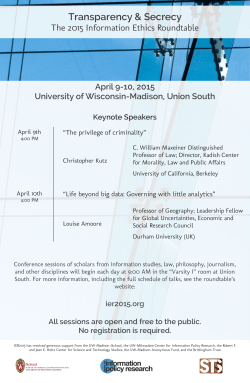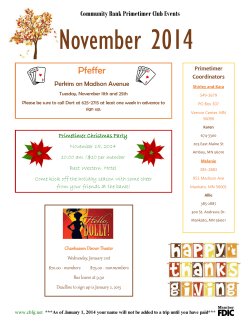
Zeide CV May 2015
ANNA ZEIDE Department of History Oklahoma State University 165 Murray Hall Stillwater, OK 74074 704 S. McFarland St. Stillwater OK, 74074 annazeide@gmail.com phone: (870) 723-6687 www.annazeide.com EDUCATION Ph.D University of Wisconsin-Madison May 2014 History of Science, Medicine, and Technology Dissertation: “In Cans We Trust: Food, Consumers, and Scientific Expertise in Twentieth-Century America” Committee: Gregg Mitman, advisor; William Cronon, Judith Walzer Leavitt, members Preliminary examination fields: Environmental History, History of Science in America, History of U.S. Public Health Minor: U. S. History M.A. University of Wisconsin-Madison History of Science, Medicine and Technology May 2008 M.A. Washington University in St. Louis Master of Arts in Science Education Missouri Teaching Certification, Biology 9-12 August 2006 B.A. Washington University in St. Louis Environmental Studies and Biology majors; Writing minor summa cum laude, Phi Beta Kappa May 2005 RESEARCH AND TEACHING INTERESTS Environmental History, Food Studies, American History and Culture, Environmental and Health Justice, Consumer and Business History, History of Science and Medicine, Oral History, Public Humanities, Community Engagement, Undergraduate Writing FELLOWSHIPS AND AWARDS Public Humanities Fellowship, UW-Madison Center for the Humanities, 2013-2014 Mellon-Wisconsin Summer Fellowship, 2012 UW-Madison Exceptional Service Teaching Assistant Award, 2011 National Science Foundation, Graduate Research Fellowship, 2006-2009 University Fellowship, UW-Madison, 2006 John Neu Distinguished Graduate Fellowship, History of Science, UW-Madison, 2006 PUBLICATIONS AND OTHER WRITING Academic: “Death by Olives: The American Canning Industry and Botulism Research in the 1920s” Under review in Journal of the History of Medicine and Allied Sciences. “Building Taste and Trust: The Civil War's Influence on the U.S. Canning Industry.” Repast: Quarterly Publication of the Culinary Historians of Ann Arbor, XXIX, no. 1. Civil War Sesquicentennial Series (Part 4) (Winter 2013): 4-7. Review of American Tuna: The Rise and Fall of an Improbable Food by Andrew F. Smith, Food, Culture, and Society, 16, no. 5 (December 2013): 691-693. Review of Sex, Sin, and Science: A History of Syphilis by John Parascandola, Pharmacy in History, 52, no. 2 (2010): 86-87. Other: Dining and Opining, Blog, January 2011-2015, <www.diningandopining.blogspot.com> Anna Zeide, Food Studies Special Series, Grist Magazine, Fall 2011. <http://www.grist.org/ article/series/food-studies> PRESENTATIONS “Regulating Processed Food: The Canning Industry’s Responses to Environmental Law in the 1970s,” American Society for Environmental History Annual Conference, Washington, D.C. (March 2015). “Digital Storytelling and Public Humanities Programming,” 7th Annual Conference on the Public Humanities, The Public Good, Center for the Humanities, University of WisconsinMadison, (April 2014). “Growing a Better Pea: Canners, Farmers, and Agricultural Scientists in the 1910s and 1920s,” History of Science Colloquium, University of Wisconsin-Madison (October 2012). “Finding the Roots of the American Food Industry Beneath the Cannery Floor,” Culinary History Enthusiasts of Wisconsin, Madison, Wisconsin (May 2012). “From the Imagined Consumer to the Controlled Consumer or Thinking on Narrative Turning Points,” Brown Bag Presentation, Department of the History of Science, University of Wisconsin-Madison (April 2012). “The ABCs of Crops and Cans: Grading for Quality in the U.S. Canning Industry,” Agricultural History Society Annual Conference meeting, Springfield, Illinois (June 2011). “From Farm to Can: Seed Breeding in the Early American Canning Industry,” History of Science Society Annual Conference, Montréal, Quebec (November 2010). “From Farm to Can: The Canning Industry and Agricultural Production in the Early Twentieth Century,” Workshop for the History of Environment, Agriculture, Technology, and Science (WHEATS), Madison, Wisconsin (August 2010). “Who Speaks for the Consumer? Canned Food Labels and the Fight to Represent the Consumer in the New Deal Era,” CHE Graduate Student Symposium, University of Wisconsin (April 2010). “Regulating Food in a Time of Scarcity: Protecting Consumers in the 1930s,” American Society for Environmental History Annual Conference, Portland, Oregon (March 2010). “Responses to The Plow that Broke the Plains,” as part of “The Reel Dust Bowl: Roundtable on The Plow that Broke the Plains and the Role of Film in Environmental History,” American Society for Environmental History Annual Conference, Boise, Idaho (March 2008). TEACHING EXPERIENCE University Level: Lecturer, “Survey of American History” (online course), History Department, Oklahoma State University, Spring 2015. Instructor, “Eating and Memory: Writing Oral Histories of Food,” Community and Environmental Sociology, University of Wisconsin-Madison, Spring 2012. Instructor, “Composing a Shared Meal: Food, Ethics, and Community,” Community and Environmental Sociology, University of Wisconsin-Madison, Fall 2011. Teaching Assistant, “The Physician in History,” History of Science, Department of Medical History and Bioethics, University of Wisconsin-Madison, Spring 2011. Teaching Assistant, “Western Civilization: Science, Technology, Philosophy II (The Rise of Modern Science),” Integrated Liberal Studies, University of Wisconsin-Madison, Fall 2010. Pre-College Level: Instructor, “ Digital Storytelling through Stop-Motion Animation,” Meadowood Neighborhood Center, Madison Children's Museum, Madison, WI, Fall 2013. Instructor, “You Are What You Eat: Environmental Studies through Food,” Pre-College Enrichment Opportunity Program for Learning Excellence (PEOPLE) for students of color and low-income students, University of Wisconsin-Madison, Summer 2010. RELEVANT WORK EXPERIENCE Public Humanities Fellow, Madison Children's Museum, UW-Madison Center for the Humanities, Fall 2013-Spring 2014 • Wrote case statements and grant proposals related to sustainability, health, humanities, and community outreach initiatives. • Collaborated with undergraduate interns and museum staff on program-building . • Helped design programs and museum exhibits to promote individual, community, and environmental health for local children and adults. Project Assistant and Webmaster, Center for Culture, History, and Environment (CHE), Fall 2007-Spring 2008, and Fall 2012-Spring 2013. • Coordinated multidisciplinary events, visiting speakers, center memberships, place-based workshops, and other cross-campus collaborations. • Recruited new graduate students and faculty to the Center through events, lectures, and other activities. • Maintained and updated the CHE website (che.nelson.wisc.edu), which serves as a teaching and outreach resource for a broad environmental humanities community. Food Programming Liaison, GreenHouse Environmental Learning Community, University of Wisconsin-Madison, January 2011-May 2012. • Taught two undergraduate courses; mentored undergraduate students in environmental and food topics, careers, and ideas. • Planned and implemented Global Food for Thought Meal Series with community and campus partners. • Served as a point of contact for and organizer of food-related activities, among undergraduate students, campus departments, and local organizations Resident Advisor, Washington University in St. Louis, St. Louis, MO, August 2003-May 2006. • Mentored undergraduate students (51 freshmen in 2003-2004; 170 upperclassmen in 2004-2006), creating programs targeting their intellectual, emotional, and social needs. • Participated in 400+ hours of training for skills in leadership, counseling, teamwork, and communication. PROFESSIONAL ACTIVITIES “Preparing Online Instructors,” Certificate Course for Online Instruction, Oklahoma State University, September 2014. "Writing Food: A Writing Workshop in Creative Non-Fiction," Seminar with Laura Shapiro, Cullman Center Institute for Teachers, New York Public Library, July 2012. Mellon/Wisconsin Dissertation Writing Camp II, Writing Center, University of WisconsinMadison, June 2012. Coordinator, Local Foods Tour, American Society for Environmental History Annual Conference in Madison, WI, March 2012. Organizer, Oral History Workshop, University Libraries and Archives, University of WisconsinMadison, August 2010. Graduate Student Representative, Center for Culture, History, and Environment Executive Committee, Fall 2008- Spring 2009. Organizing Committee, Center for Culture, History, and Environment, Agricultural Landscapes Place-Based Workshop to Wisconsin’s Driftless Area, May 2008. UNIVERSITY AND COMMUNITY SERVICE Communications Coordinator, Wisconsin School Gardening Initiative, Community GroundWorks, Madison, WI, May 2013-August 2013. Co-founder and Organizer, Madison Storytellers, Madison, WI, April 2012-August 2013. Principal Organizer, Global Food for Thought Meal Series, GreenHouse Environmental Learning Community, University of Wisconsin-Madison, January 2011-May 2012. Planning Committee, Madison Youth Grow Local Conference, Community Groundworks, Madison, WI, Spring 2010 and 2011. Social Media Coordinator, Communications Committee, Community GroundWorks, Madison, WI, Fall 2009-Present. Community Liaison through Green Screen: Community Engagement through Film, University of Wisconsin-Madison and Community GroundWorks, Fall 2009 Panelist for New Graduate Student Orientation, Office of Fellowships and Funding Resources, University of Wisconsin-Madison, August 2009. Graduate Student Mentor, History of Science, UW-Madison, 2008-2012. Organizing Committee, Tales from Planet Earth Community and Environmental Film Festival, University of Wisconsin-Madison, Fall 2007 and 2009.
© Copyright 2025









